Graham Reid | | 8 min read
Cream: I Feel Free
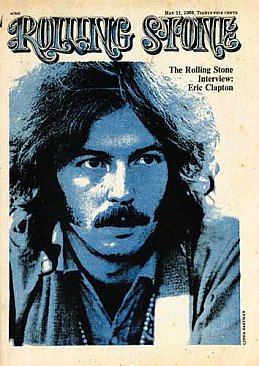
It's hard to pinpoint exactly when
Eric Clapton -- once called "God" by his devotees -- ceased
to be relevant. Certainly he still plays to huge audiences and his
guitar playing remains technically undiminished.
But his albums are --with rare
exceptions -- anodyne, his playing often bloodless and despite
genuine efforts to find inspiration (working with BB King, his dreary
Robert Johnson tribute illustrating how far removed he was from his
muse, an album with JJ Cale) he is firmly on the margins of interest:
respected, revered even, but not relevant.
His last great solo album? His blues
album From the Cradle in '94 certainly topped the charts, but my
money would be on Journeyman of '89 when you sensed, for the first
time in many years, he was really pushing himself.
But anything in the Nineties or the
past decade? Sparks but no fire -- and which, if any, of all those
live albums? Obviously people have a sentimental attachment to
Unplugged in '92, largely because of his lovely, heartbreaking Tears
in Heaven. But . . .
Clapton was always a guitarist, first
and foremost.
Punk may have done its best to expunge
the Dreaded Guitar Solo from rock music but the offspring of Led Zepp
and Hendrix are still out there, posturing and playing tedious solos
while the singer tries to think up a line as pithy and smart as “
‘Scuz me while I kiss the sky . . ."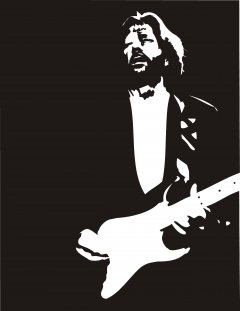
But these are guitar-rock young men,
and as someone in Creem pointed out “heavy metal is for young men
without a war of their own.” The big question is, where do the old
ones go, the Sixties boys who first fashioned all this rebel rock out
of black r’n'b.
Mick Jagger' stage style shows the old
bad boy has transcend from rock star into a kind of soul-review
frontman. (For a while Jagger seemed to think he was Tina Turner,
Peter Tosh, then on his solo tour convincing himself he was James Brown.)
But for an aging rock star that is
perhaps the only available option - black musicians and their
audiences have a notorious disregard for age and nobody seems put off
BB King just because the man could get into movies half-price.
Clapton is luckier than most in this
regard - as a blues musician he always had that option before him and
that’s why he’s still here. It's also why he’ll still be around
with dignity (and a nice suit) long after the current crop of heavy
heroes - enjoyable though they are - are trying to get their tattoos
removed or else end up looking a little - um -- embarrassing?
But Clapton’s output from the
Eighties output has been erratic -- and there is a case to be made
that by the end of that decade he had ceased to be relevant.
The evidence was all on Crossroads,, a
six-album (four-CD or four-tape) set released in '89 which cames with
an annotated booklet and in cover art by Rolling Stone Ron Wood.
Unlike many such collections (Santana's
of the same period), this wasn’t a revisionist look at his career
but presented a fair cross-section of all Clapton's periods and
personae -- from the first Yardbirds studio session in late '63
through to his patchy - but his biggest selling solo album to that
time – August of '88.
And even now it is crammed full of
discoveries.
About a third of the chronologically
ordered tracks are familiar enough (For Your Love from '64, Sunshine
of Your Love with Cream in '67, Cocaine in '77 and so on); another
third are live or alternative versions; and the remainder are
unreleased recordings, among them a slow, restrained version of
Robert Johnson's Crossroads (from a '70 Delaney & Bonnie tour).
Crossroads is the perfect title for
this enormous, 73-track set. It conjures up Johnson whose razor-thin
style Clapton unashamedly acknowledged and for Sixties longhairs it
brings to mind the live version from Cream’s Wheels of Fire double
set, listened to at impenetrable volume at the pharmaceutical swap
meets people called parties.
For another generation of up-and-coming
guitarists poised to listen to Clapton anew it echoes the Ralph
(Karate Kid) Macchio movie of the same name and again invokes the
spooky voodoo Johnson magic. For those coming at Clapton, a legend
whom they may have heard of but not heard, from the contemporary
rock end there are some thrilling, raw and impassioned performances from
that period before he was lost to lifeless, uncommunicative
performances in stadiums.
Brought together by Polydor executive
Bill Levenson (who was also responsible for the Velvet Underground
box set and their unreleased recordings album) it was an 18-month
labour of love to mark Clapton’s 25th year in music and the CD
version shot to the top of Billboard's CD charts within a month of
its release.
The Yardbirds material ('63-'64) seems
chosen more for its historical interest and unavailability than
anything else. Material from Five Live Yardbirds (64) is passed over
in favour of songs from the groups first studio session: John Lee
Hooker’s Boom Boom Boom, Jimmy Reed's Baby What's Wrong and Honey
in Your Hips -- a little known but appealing Bo Diddley-type thing
written by vocalist Keith Relf.
At the time Clapton had no British pop
counterparts who could play a solo as sublime as the 20 seconds he
crams into Good Morning Little Schoolgirl, or the barbed-wire sound
of A Certain Girl.
Check his playing on I Wish You Would
for a pointer where he would go in Cream.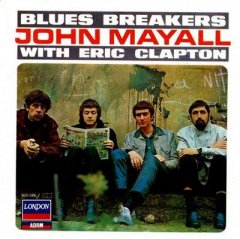
The year-long tenure with John Mayall
('65-’66) allowed him to get his blues purist attitude in check and
listen to a broader range of blues guitarists. Out of the amalgam of
Otis Rush, Buddy Guy, Elmore James and Freddie King he emerged as the most
distinctive guitar hero of his generation.
The Mayall/Clapton material on
Crossroads includes the improbable and rare single Lonely Tears (with
Mayall doing strangulated vocal yelps) and its flipside, the
instrumental Bernard Jenkins.
Better are the three tracks from the
Bluesbreakers album -- the killer Freddie King track Hideaway, All
Your Love and Clapton's first serious vocal outing on Robert
Johnson's Ramblin' on My Mind.
And on this exceptionally well arranged
collection the period ends with the line-up of the Bluesbreakers from
early ‘66 which included the jazz-influenced bassist Jack Bruce on
a live recording of Have You Ever Loved a Woman.
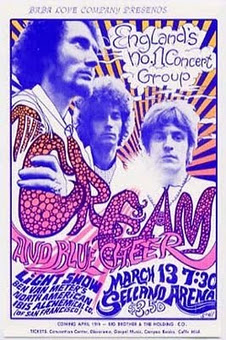 “The faithful are flipping out,”
reported Time magazine in ’68 at the height of Cream-mania -- and
after commenting on their “motley blur of polka-dot pants, fringe
suede shirts, neck chains and psychedelic cowboy garb"
acknowledged Cream "go beyond oddity into originality."
“The faithful are flipping out,”
reported Time magazine in ’68 at the height of Cream-mania -- and
after commenting on their “motley blur of polka-dot pants, fringe
suede shirts, neck chains and psychedelic cowboy garb"
acknowledged Cream "go beyond oddity into originality."
In that strange sartorial context the tracks by Cream -- the power trio of Clapton with Bruce and
drummer Ginger Baker -- are approached with trepidation. Fortunately
this collection errs in favour of the group’s more economic singles
and here are the odd and unsuccessful first one, Wrapping Paper, the
still entrancing I Feel Free and the album tracks Spoonful (with an
astonishing use of feedback as a natural part of Clapton’s solo),
Strange Brew, Sunshine of Your Love and Tales of Brave Ulysses.
The only live track is Crossroads (from
Wheels of Fire, `68). A bonus is the previously unreleased Steppin'
Out which adequately compensates for the also-unreleased but rather
stiff version of Lawdy Mama, a particular favourite of Clapton's at
the time.
Clapton's transitional bands between
Cream and his Seventies solo career (the short-lived Blind Faith, the
huge touring band of Delaney & Bonnie which he sat in with, and
Derek and the Dominos) take the set into what many consider the
guitarist's greatest (but most personally troubled) years.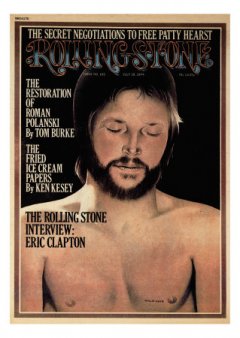
It is here Crossroads becomes an
especially valuable document.
Not only is the familiar Layla here but
so is an extraordinary version of Tell the Truth and the saucy Roll
It Over (recorded during sessions for George Harrison’s All Things
Must Pass triple set). The previously unreleased versions of Key to
the Highway and Crossroads give a big picture of his playing during
this two year period.
Add to those five further unreleased
tracks (including a scorching Evil) recorded for a second Dominos
album and it is easy to see why this set has been so acclaimed.
After the guitar heroics and the
agonized brilliance of his watershed Layla sessions it was almost
inevitable his studio work through the Seventies and Eighties would
suffer in the comparison.
However the space/time economies of
compilations show just how many hits and well-received songs Clapton
has released during that so-called "lean” period. (But does
anybody enjoy twaddle like Promises and She’s Waiting?)
Crossroads offers up a long but taut
live recording of Bob Marley’s I Shot the Sheriff (which cuts the
studio version dead from the first few bars), the single Knockin’
on Heaven’s Door from ’75, J. J. Cale’s Cocaine and, curiously,
another run at After Midnight which is used in a Michelob Beer
advertisement.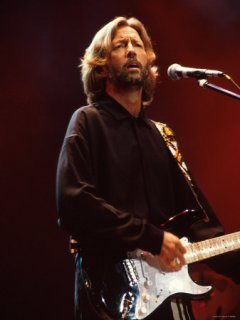
Compiler Levenson has also included
five unreleased studio tracks (intended for albums) among them a
cover of Peter Tosh's Watcha Gonna Do plus a strong version of
Further on up the Road from a London concert in ’77.
Crossroads is a huge set. But in sweeping up Clapton's first 25 years it also reminds you of just what has been subsequently lost.
In a few years there could, conceivably be, a set picking up his second 25 years.
But would it be of much, or any, interest?
Could it stretch to this breadth, emotionally or even
in just the number of songs.
But there it is, Crossroads -- 73
tracks from the man they once called God . . . and who became the
living link between hippies and yuppies.
Like this? Then check out the interviews, reviews and overviews at Blues in Elsewhere.

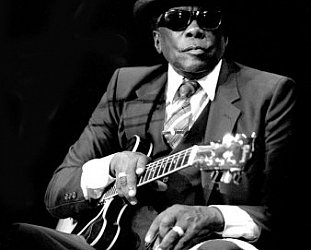
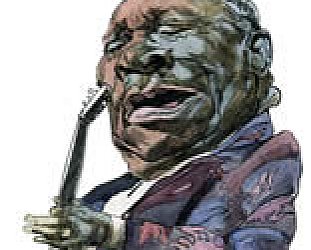
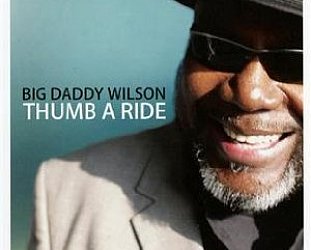
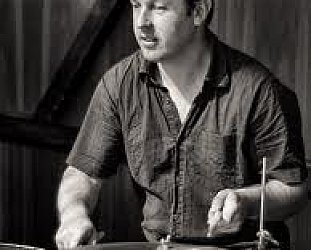
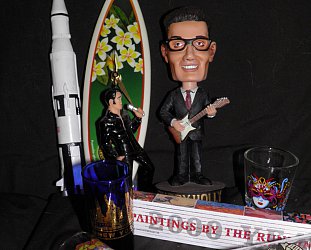
Clive - Aug 24, 2010
There is a second Crossroads 4 CD set called Crossroads 2(Live in the Seventies),a bit of a play on words but it is live performances from 1974 to 1978.I highly recommend it with lots of blues and the more rockier songs.Most of it features the great 461 Ocean Boulevard band with those 2 lovely ladies(yes Yvonne and Marcy)Check out Yvonne on the Willie and the handjive morph into Get Ready
SaveJP - Sep 26, 2010
To be fair though, there aren't many mainstream acts with a 50 year career where a box set of the 2nd 25 years would be anywhere near as interesting or groundbreaking as one covering the first 25. A few might come close I guess; Bowie, maybe McCartney, Prince, Robert Plant... uhh?
SaveEric had some terrific songs on some average albums in the 80s eg. Same Old Blues on Behind the Sun, Holy Mother on August, but they got bogged down in Phil Collins 80's production. Live versions I've heard blow the studio ones out of the water, but that's true of pretty much every Clapton song ever.
For a latter-years box set you could also look at his soundtrack work, Edge of Darkness and Rush were fantastic. Some interesting work on the TDF album too. And of course Journeyman and From the Cradle are great. I mightn't be able to fill a 4CD set to come close to matching the original Crossroads box, but I could probably make a decent double CD.
JP - Sep 27, 2010
Heck, I missed Dylan of my list. His 90s & 00s albums have been amazing ('Under the Red Sky' not so much though). And Prince of course is still only a little way into his 2nd 1/4 century - don't know what I was thinking above.
Savepost a comment